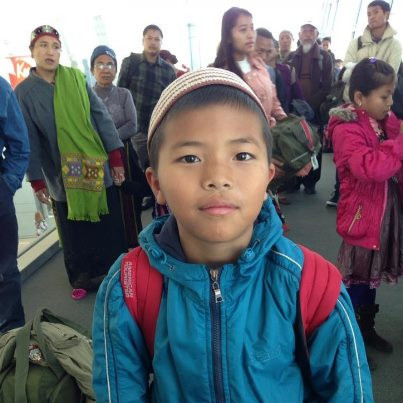Aliyah: Tribe Of 'Lost Jews' In Northeastern India Seek To Migrate To Israel

A small tribe of people from a remote corner of northeastern India claim they are the descendants of Jews and are seeking asylum in Israel. In the Indian state of Manipur, which borders Myanmar (Burma) to the east and Bangladesh to the west, thousands of local people have either converted to Orthodox Judaism over the past few decades or claim they belong to a group called the Bnei Menashe, who believe they trace their ancestry to one of the Lost Tribes of Israel. Manipur, which is overwhelmingly Christian, is beset by ethnic strife, a militant insurgency, political corruption, narcotics trafficking and economic stagnation.
Jeremiah Hangsingh, nicknamed "Pau," is one of the Manipuri Jews who dreams of migrating to Israel. His family, including father Abel and mother Sharon, follow Judaism devoutly. But like many young people who live near the opium-producing regions of nearby Burma, Pau suffers from long-term heroin addiction. “My father always encouraged me to change my life,” Pau told Al-Jazeera. “He always told me, ‘We’ll [get] a passport and go to Israel.’” Speaking of his desire to emigrate to Israel, Pau added: “It is the land of the Jews. It will change my life. And there will be no drugs there.”
The Bnei Menashe -- actually the Kuki-Mizo-Chin tribes of northeastern India -- think they are descended from the Menasseh tribe, who departed Israel in the eighth century B.C. after the Assyrians invaded. From that date, according to their oral tradition, the tribe migrated eastward along the Silk Route for centuries before ending up in the Indian states of Manipur and Mizoram, (more than 3000 miles away from present-day Israel). Stephen Epstein, writing in Bneimeshase.com, noted that “evidence of their Jewish roots is very strong, with customs such as performing circumcision on the eighth day after birth, honoring levirate [where the brother of a dead man must marry his brother's widow] marriages, offering sacrifices on altars and wearing shawls that resemble the Talit [prayer shawl].”
For the Kuki, who are outsiders even in Manipur, Judaism holds much appeal as a haven for outcasts. “It is a dream come true,” said a Kuki man named David. “This [Manipur] is not the land that we belong to. We are not a part of India. We want to connect to Israel. We want to return.”
In the 1970s, an Israeli rabbi named Eliyahu Avihayil visited the Bnei Menashe tribe in India and noted their similarities to the practices of traditional Judaism. But his efforts to convince the Israeli government to recognize them as Jews and allow them to immigrate to Israel initially failed. Under the "Law of Return," anyone who can prove they are Jewish can migrate to Israel (aliyah) and settle there with full citizenship.
Al-Jazeera estimates about 7,000 Bnei Menashe currently reside in India, while about 2,000 have already settled in Israel. An Israeli nonprofit group called Shavei Israel has helped hundreds of Jews from India move to Israel over the past few years. This year, about 900 of them will receive Israeli citizenship. Last month, another 160 Jews from Mizoram, an Indian state adjacent to Manipur, arrived in Israel. “We have been waiting eagerly to come home to our ancestral lands,” said Elyashiv Khupchwang, a young Bnei Menashe told JNS news service. “I am so proud of this moment and feel such peace about finally making it home.”
The JNS news service reported that Christian Zionists, the International Christian Embassy Jerusalem (ICEJ), is also assisting Indian Jews immigrate to Israel. David Parsons, spokesman for ICEJ, said that after the Indian immigrants complete Hebrew-language classes and the process of conversion, they will be moved into flats in Galilee. “The Bnei Menashe have shown incredible patience and determination in their desire to rejoin the Jewish people back in the Land of Israel. It is our privilege to assist them in realizing the hope of so many generations to return to Zion,” Parsons told JNS.
Indian Jews who make it to Israel must contend with a multitude of new problems, including the skepticism of some Israelis who suspect they co-opt a fake Jewish identity in order to escape a poor, strife-torn homeland for a wealthier nation. Even in India, their claims are mocked and questioned. For example, the Central Forensic Institute in Calcutta conducted DNA studies that revealed that Bnei Menashe men had no genetic links whatsoever to Israel, although some female members of the tribe apparently shared some DNA with Middle Eastern peoples, most likely through intermarriage.
In Israel, already facing illegal immigration from Africa, the influx of Bnei Menashe from India has become politicized. Tablet Magazine reported that Meir Sheetrit, a member of the Knesset (parliament) and a former Interior Minister, told army radio that the arrival of Bnei Menashe “endangered the Jewish identity of the state.” Nonetheless, in 2005, Israel’s chief Sephardic rabbi, Shlomo Amar, recognized the Bnei Menashe as true descendants of one of the Lost Tribes of Israel, allowing for their lawful transit.
The Arutz Sheva newspaper reported that Yariv Levin, a member of Israel's knesset for the Likud party, strongly supports providing asylum to the Bnei Menashe. Shavei Israel's chairman, Rabbi Michael Freund, recently welcomed a group of Jews from Mizoram this way at Ben Gurion airport: “Your arrival provides us all with yet another reason to celebrate, your return after more than 2,700 years is proof that the ingathering of the exiles continues to move forward.”
© Copyright IBTimes 2025. All rights reserved.





















